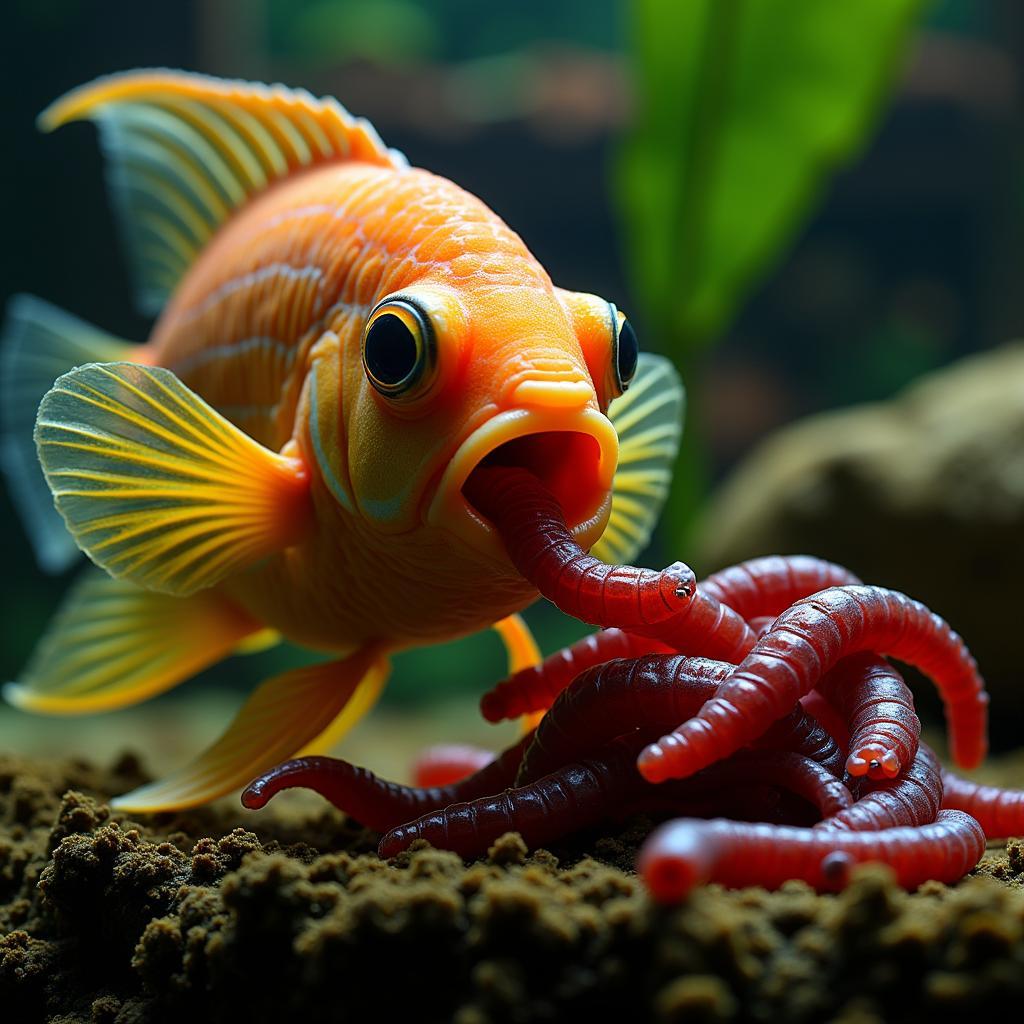Finding the Best Fish Food For Angelfish can be a daunting task with so many options available. This guide will explore the dietary needs of angelfish and delve into the various types of food available, helping you make an informed decision for your finned friends. We’ll discuss everything from flakes and pellets to live and frozen foods, ensuring your angelfish thrive.
Understanding Angelfish Nutritional Needs
Angelfish are omnivores, meaning their diet should consist of both plant-based and animal-based foods. A balanced diet is crucial for their vibrant colors, strong immune system, and overall well-being. Essential nutrients include protein, vitamins, minerals, and fiber. Protein helps with growth and tissue repair, while vitamins and minerals support various bodily functions. Fiber aids in digestion and prevents constipation. Choosing the best food for angelfish involves understanding this delicate balance.
Protein Sources for Angelfish
High-quality protein sources are essential for angelfish growth and development. These include insect larvae, brine shrimp, bloodworms, and krill. These foods mimic their natural diet in the wild, providing the necessary amino acids for optimal health. Commercial fish foods often contain these ingredients, but it’s crucial to choose brands that prioritize quality and avoid fillers.
Plant-Based Foods for Angelfish
While protein is vital, plant matter plays an equally important role in an angelfish’s diet. Spirulina, algae, and other plant-based ingredients provide essential vitamins, minerals, and fiber. They also contribute to the vibrant coloration of your angelfish. Many commercial fish food for angelfish include spirulina or other plant-based ingredients, often in flake or pellet form.
Types of Angelfish Food
There’s a wide variety of angelfish food available, each with its own pros and cons. Understanding the different types will help you choose the best fish food for angelfish.
Flakes
Flakes are a popular and convenient option for feeding angelfish. They are readily available and affordable. However, they can quickly foul the water if uneaten. Choose high-quality flakes with a good balance of protein and plant matter.
Pellets
Pellets are another common choice, often providing more concentrated nutrition than flakes. They also tend to sink, which can be beneficial for bottom-feeding angelfish. Sinking pellets are especially helpful for shy or less aggressive eaters.
Live Food
Live food like brine shrimp, daphnia, and bloodworms are a great way to provide your angelfish with a natural and stimulating meal. They are highly nutritious and encourage natural foraging behavior. However, sourcing and storing live food can be challenging and requires careful attention to hygiene. Live food for fish can offer a great nutritional boost but requires careful handling.
 Angelfish Eating Bloodworms
Angelfish Eating Bloodworms
Frozen Food
Frozen food offers a convenient alternative to live food, preserving the nutritional value while eliminating the hassle of live cultures. Bloodworms freeze dried food is an excellent example of this, providing essential nutrients in a convenient format. Simply thaw the required amount before feeding.
What is the ideal feeding frequency for angelfish?
Angelfish should be fed small amounts two to three times a day. Overfeeding can lead to water quality issues.
How do I know if my angelfish are getting enough food?
Observe your angelfish during feeding time. They should actively consume the food within a few minutes. Uneaten food should be removed to prevent water contamination.
Choosing the Right Food for Your Angelfish
The best fish food for your angelfish will depend on their age, size, and specific needs. Young angelfish require more frequent feedings with a focus on growth-promoting foods. Adult angelfish can be fed a more varied diet, including a mix of flakes, pellets, frozen, and occasional live foods. Angelfish best food should always be high-quality and provide complete nutrition.
“Variety is key when it comes to feeding angelfish,” says Dr. Emily Carter, a renowned aquatic veterinarian. “A diverse diet ensures they receive all the necessary nutrients for optimal health and vibrant coloration.”
Conclusion
Choosing the best fish food for angelfish is a crucial aspect of responsible fishkeeping. By understanding their nutritional needs and the various food options available, you can ensure your angelfish thrive and live a long, healthy life. Remember, a balanced diet is the key to their well-being and vibrant colors.
FAQ
- What should I feed my baby angelfish?
- Can angelfish eat vegetables?
- How often should I feed my adult angelfish?
- What are the signs of an unhealthy angelfish?
- How can I prevent overfeeding my angelfish?
- What are some good quality angelfish food brands?
- Can I make my own angelfish food?
For further assistance, please contact us at Phone Number: 02437655121, Email: minacones@gmail.com or visit us at 3PGH+8R9, ĐT70A, thôn Trung, Bắc Từ Liêm, Hà Nội, Việt Nam. We have a 24/7 customer support team.